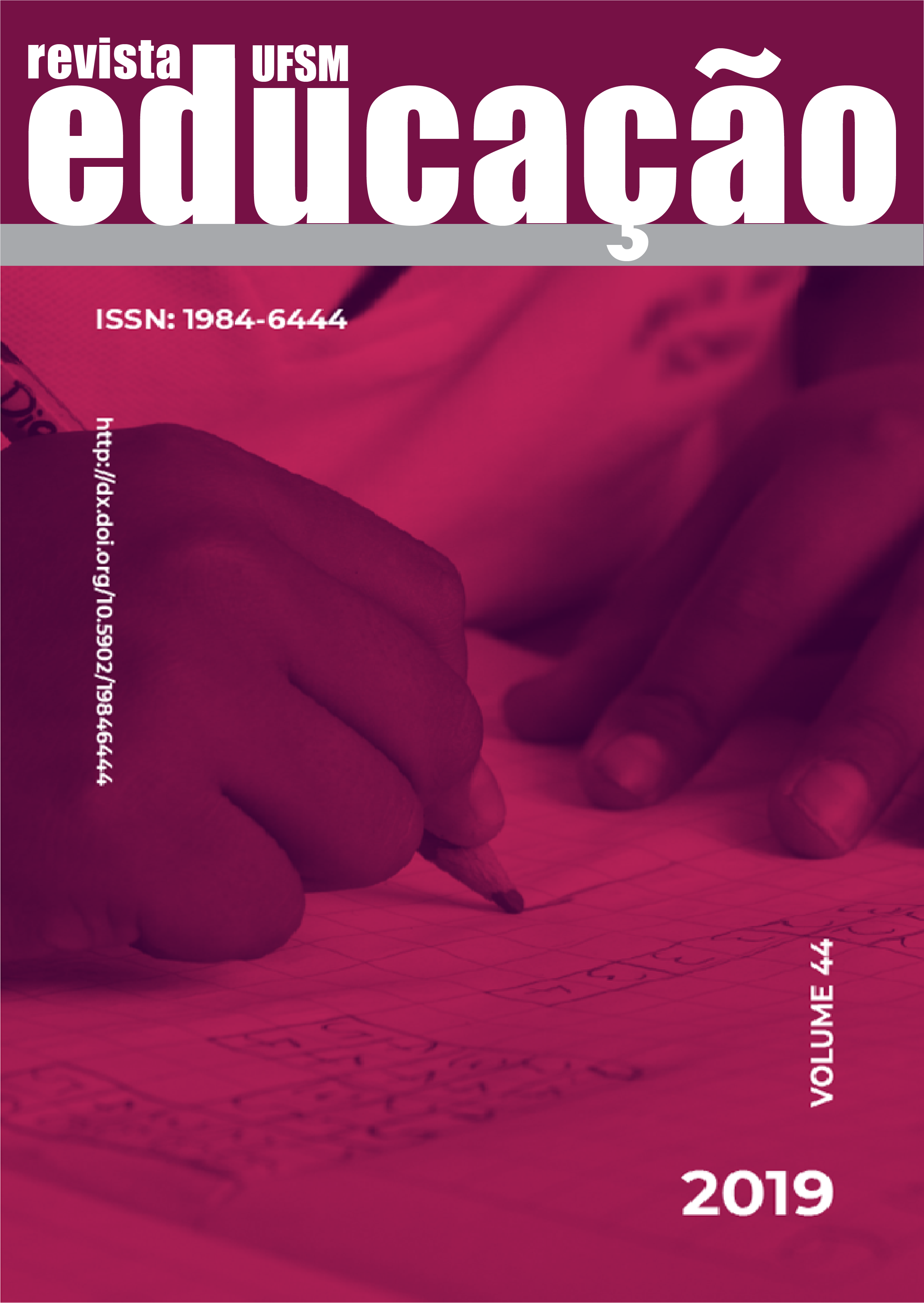Acknowledgment and popular education: a democratic-republican perspective
DOI:
https://doi.org/10.5902/1984644428242Keywords:
Popular education, Acknowledgment, Democratic-republican stateAbstract
The present article addresses the controversial relationship between Popular Education and the democratic republican State. An education which, by being gestated, sponsored and oriented by the legal frameworks of this State, would also be destined to subvert it, once it is committed to the demands from excluded sectors of society and is legitimated under the aegis of the same conditions that have forged it. In view of this, we seek to identify the ambivalent democratic-republican origin of Popular Education and also verify to what extent this type of education can be conceived as an explicit manifestation of the struggle for acknowledgment, whose possible equation happens with the socio-historical dynamism of the republican democracies. This acknowledgment, in order to constitute itself reciprocally and thus transcend the mere unilaterality, asymmetry and instrumentality, needs to presuppose the radicality of the dialogue.
References
ALMEIDA, V. S. de. Educação, histórias e sentido em Hannah Arendt. Texto apresentado no GT-17: Filosofia da Educação – ANPED. Disponível em: <http://www.anped. org.br/reuniões/31ra/1trabalho/GT17-4307--Int.pdf>. Acesso em: 27 abr. 2009.
CARDOSO, S. Que república? Notas sobre a tradição do “governo misto”. In: BIGNOTTO, N. (Org.). Pensar a república. Belo Horizonte: Ed. UFMG, 2002. p. 27-48.
CASTORIADIS, C. As encruzilhadas do labirinto II: domínios do homem. Rio de Janeiro: Paz e Terra, 1987.
______. As encruzilhadas do labirinto III: o mundo fragmentado. Rio de Janeiro: Paz e Terra, 1992.
COOK, D. J. Language and consciousness in Hegel’s Jena writings. In: Hegel: Critical Assessments. Ed. Robert Stern. London: Routledge, 1993.
COSSETIN, V. F. A dissonância no absoluto: linguagem e conceito em Hegel. Ijuí: Editora Unijuí, 2012.
DA MATTA, R.. “O trânsito no Brasil é uma multidão de surtados”. Entrevista à Zero Hora, 06 de março de 2011.
FLICKINGER, H-G. A teoria do reconhecimento na práxis pedagógica: a exemplo de conflitos entre diretrizes ético-morais. In: Revista Espaço Pedagógico: educação e reconhecimento. Vol 1, n. 1. Passo Fundo: UPF, 1994.
FREIRE, P. Pedagogia da autonomia. São Paulo: Paz e Terra, 2004.
GADAMER, H-G. A incapacidade para o diálogo. In: ALMEIDA, C.; FLICKINGER, H-G.; ROHDEN, L. Hermenêutica Filosófica. São Leopoldo: Ed. UNISINOS, 2002.
HEGEL, G.W.F. Ciencia de la logica. 2 ed. Trad. Augusta e Rodolfo Mondolfo. Buenos Aires: Editora Solar, 1968.
______. Escritos de Juventud. Tradução de Zoltan Szankay e José Maria Ripalda. Fondo de Cultura Economica: Mexico, 1978.
______.Grundlinien der Philosophie des Rechts. 3 ed. Frankfurt am Main: Suhrkamp, 1995.
______. Phänomenologie des Geistes. 3 ed. Frankfurt am Main: Suhrkamp, 1996.
HONNETH, A. Luta por reconhecimento: a gramática moral dos conflitos sociais. São Paulo: Editora 34, 2003.
KOJÈVE, A. Introdução à leitura de Hegel. Tradução Estela dos Santos Abreu. Rio de Janeiro: Contraponto: EDUERJ, 2002.
OLIVEIRA, M. A. de. Educação e ética. In: PESCADOR, C. M.; SOARES, E. M. S. ; NODARI, P. C. (Org.). Ética, educação e tecnologia: pensando alternativas para os desafios da educação na atualidade. Curitiba: CRV, 2010.
______. Para além da fragmentação: pressupostos e objeções da racionalidade dialética contemporânea. São Paulo: Loyola, 2002.
RIBEIRO, R. J. Democracia versus república: a questão do desejo nas lutas sociais. In:
BIGNOTTO, N. (Org.). Pensar a república. Belo Horizonte: Ed. UFMG, 2002. p. 13-25.
______. A república. São Paulo: Publifolha, 2008.
ROHDEN, L. Hermenêutica e linguagem. In: ALMEIDA, C.; FLICKINGER, H-G.; ROHDEN, L. Hermenêutica Filosófica. São Leopoldo: Ed. UNISINOS, 2002.
ROUANET, S. P. . Habermas e a religião. In: Revista Tempo Brasileiro, abr.-set, nº 181/182, Rio de Janeiro: Tempo Brasileiro, 2010. p. 143-152.
Published
How to Cite
Issue
Section
License
Declaration of originality
We declare that all articles present in the journal Educação (UFSM) are originals and were not submitted for publishing on any other publication, as a whole or a fraction. We also declare that, after being published by Educação (UFSM), a paper will not be submitted to another journal within two years. After this time, our journal transfers the publishing rights to the authors, with a permit granted by the Editorial Council.
We also acknowledge that the originals’ submission to Educação (UFSM) implies on a transference of copyright for physical and digital publishing to the journal. In case of noncompliance, the violator will receive sanctions and penalties predicted by the Brazilian Copyright Protection Law (n. 9610, dated 19/02/98).
Attribution 4.0 International (CC BY 4.0)
This license lets others remix, transform, and build upon the material for any purpose, even commercially, and copy and redistribute the material in any medium or format.

This work is licensed under a Creative Commons Attribution 4.0 International (CC BY 4.0)






